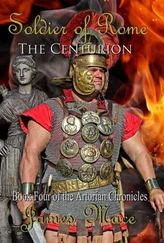James Mace - Soldier of Rome - Journey to Judea
Здесь есть возможность читать онлайн «James Mace - Soldier of Rome - Journey to Judea» весь текст электронной книги совершенно бесплатно (целиком полную версию без сокращений). В некоторых случаях можно слушать аудио, скачать через торрент в формате fb2 и присутствует краткое содержание. Жанр: Исторические приключения, на английском языке. Описание произведения, (предисловие) а так же отзывы посетителей доступны на портале библиотеки ЛибКат.
- Название:Soldier of Rome: Journey to Judea
- Автор:
- Жанр:
- Год:неизвестен
- ISBN:нет данных
- Рейтинг книги:5 / 5. Голосов: 1
-
Избранное:Добавить в избранное
- Отзывы:
-
Ваша оценка:
- 100
- 1
- 2
- 3
- 4
- 5
Soldier of Rome: Journey to Judea: краткое содержание, описание и аннотация
Предлагаем к чтению аннотацию, описание, краткое содержание или предисловие (зависит от того, что написал сам автор книги «Soldier of Rome: Journey to Judea»). Если вы не нашли необходимую информацию о книге — напишите в комментариях, мы постараемся отыскать её.
Soldier of Rome: Journey to Judea — читать онлайн бесплатно полную книгу (весь текст) целиком
Ниже представлен текст книги, разбитый по страницам. Система сохранения места последней прочитанной страницы, позволяет с удобством читать онлайн бесплатно книгу «Soldier of Rome: Journey to Judea», без необходимости каждый раз заново искать на чём Вы остановились. Поставьте закладку, и сможете в любой момент перейти на страницу, на которой закончили чтение.
Интервал:
Закладка:
Chapter XX V: Curse of the Damned
Jerusalem
March, 33 A.D.
Pilate loathed Jerusalem. During the Jewish Passover celebrations, the city’s population swelled to nearly a million souls, and as such, there were bound to be brawls and public incidents to quell. He left most of this to the Sanhedrin and their special police, augmented by his auxiliaries. Artorius and his legionaries were kept near the palace as his personal bodyguards, while also serving as a reaction force should things get out of hand in the city. As Rome’s representative, Pilate had the duty of addressing the populace and reminding them that, though given a certain amount of autonomy by grace of the emperor, they were still subjects of Rome. Passover afforded him the best opportunity to speak to the people.
There was also an obscure tradition of sorts where the Roman governor would release one condemned prisoner on the people’s recognizance. Personally, he felt the idea to be revolting. During his first year he had allowed one prisoner to be freed, in hopes of showing a bit of magnanimity to the people. The result had been that the man subsequently raped a merchant’s wife and stolen his horse. After his recapture, Pilate had had the man crucified in the marketplace, as opposed to the rock of Golgotha. This caused an outrage amongst the people rather than prevailing to their sense of justice. Even the merchant, whose wife had been raped, cried out against the man’s punishment!
To add to his grief, the emperor received word of the execution and strongly admonished Pilate for it, as under Roman law once a man had been given pardon for a capital crime, he could not subsequently receive the death penalty. Because of this, Pilate had immediately ceased the practice of releasing prisoners on Passover and all future executions were carried out at Golgotha. He was relaying this story to his staff when a pair of legionaries entered. Artorius raised his eyebrow when he saw they had his servant, Nathaniel, with them. The legionaries halted and saluted.
“Sir, this man claims to have knowledge of a possible Jewish rebellion within the city,” one of the men stated.
“Nathaniel, what the hell?” Artorius said. “I wondered where you’ve been!”
“Apologies, master,” Nathaniel replied, his head bowed.
“So he is your servant?” the other legionary asked.
“Yes, he’s my servant!” Artorius snapped.
“Sorry, sir, it’s just that one Jew looks the same as any other to us. We get a dozen of these ‘informants’ coming to us every week, Always trying to either fill their coffers with reward money or looking to eliminate some personal rival who was fucking their wives.”
“If this man has information, you would do well to listen to him,” Pilate asserted. “He’s the one who discovered the arms smuggler, Barabbas, in the first place.” He waved the legionaries off, who saluted and started to leave.
“Fetch the other centurions,” Artorius called out to the men.
“Yes, sir.”
Artorius and Pilate then turned their eyes on Nathaniel, who raised his head and met their gaze.
“Forgive me, masters, I tried to come sooner, but I had to stay hidden for a time,” Nathaniel began. “I went to see one of the Nazarene’s disciples speak over near the slave market.”
“Dear gods don’t tell me your man is taken by this Nazarene as well!” Pilate interrupted with a glare towards Artorius.
“You said so yourself. We should respect the personal beliefs of all, even the Jews,” Artorius replied calmly. He nodded to Nathaniel, who continued.
“I was standing with my back next to an alleyway. Well, I recognized one of his disciples, though I cannot remember the man’s name. He was met by a pair of rather surly looking characters in the alleyway. I noticed one of them was armed, and curiosity got the best of me. I followed them and hid next to a refuse pile when I heard the men speak.”
“Did you get a look at any of them?” Pilate asked.
Nathaniel shook his head. “No, master. But I did hear one of the men speak about ‘bar Abbas’ or maybe it was Barabbas. I’m not sure which.”
“Ah, yes, our friend Jesus Barabbas,” Justus stated as he and the other centurions walked into the hall. “The weapons smuggler and rapist who Artorius captured.”
“Jesus,” Artorius noted. “That’s the Nazarene’s name as well.”
“It’s common enough in these parts,” Pilate observed dismissively. “Asking how many Jews are named Jesus or Joseph is like going to Rome and asking how many are named Gaius or Titus.”
“Barabbas is an enigma to us,” Justus remarked. “Even his name is cryptic. ‘Bar’ means ‘son of,’ so his name could be ‘Jesus son of Abbas.’ By the same token, ‘Abbas’ means ‘the father,’ sometimes in reference to their god.”
“I don’t give a vat of piss what his name means!” Pilate snapped with a scowl. “I know who Barabbas is, I do sign the warrants, you know. He’s grown ambitious if he’s moved on from smuggling the occasional sword to plotting sedition and murder. I take it, then, that these men are his followers?”
“They are, master,” Nathaniel asserted. “I heard one of them say, ‘it is time’. Many within the city are anxiously awaiting the Nazarene’s return to the city, and this is when they are planning to take the Antonia Fortress and freeing Barabbas.”
“This Nazarene,” Pilate interrupted. “He’s the supposed prophet who told the people to pay their taxes.”
“Render unto Caesar what is Caesar’s,” Justus quoted aloud.
“He’s becoming more useful to us,” Pilate observed.
“Maybe so,” Artorius replied. “But he’s also proving useful to Barabbas’ followers. With the masses thronging to greet his arrival, his followers think we will be too distracted to stop them from taking the fortress, freeing him, and the others.”
“Then we should bar all the gates and make sure he cannot get in,” Cornelius said.
Artorius shook his head. “We’ll do no such thing,” he responded. “If we bar up the fortress every time there is rumor of unrest, the city would cease to function altogether.”
“I hate this fucking place,” Pilate grumbled as he rested his head on his clenched fist. “It’s only during this bloody Passover time that I have to be in Jerusalem.”
Artorius nodded in understanding and then turned to Abenader. “The auxilia will oversee the Nazarene’s arrival and keep the crowds in order.”
“Understood,” the auxilia commander replied, notably refraining from calling Artorius ‘sir’. Though he had a far greater number of men under his command, Abenader still resented that Artorius was nominally his superior. The issue of seniority still continued to rear its ugly head, especially in light of the latest reprimand Abenader had received from Artorius regarding the persistent lackluster discipline of his auxiliaries.
Artorius then turned his attention to his legionary centurions. “We’ll let Barabbas’ followers in to the Antonia fortress. Getting out will prove far more difficult.” He grinned wickedly at his last remark, eliciting some knowing chuckles from his men.
As Artorius left the meeting he was intercepted by Sergeant Cicero. Many of the lads still jested that he must be related to the famous orator of the same name. This was preposterous, as the Cicero whose death even his rival Julius Caesar lamented had come from a very wealthy and noble line. The man who mended breaks in their armor and kept their swords from cracking was a metal smith, as had been his father, and his father’s entire family for as long as could be remembered.
“Centurion Artorius!” Cicero called, waving his cohort commander down.
Читать дальшеИнтервал:
Закладка:
Похожие книги на «Soldier of Rome: Journey to Judea»
Представляем Вашему вниманию похожие книги на «Soldier of Rome: Journey to Judea» списком для выбора. Мы отобрали схожую по названию и смыслу литературу в надежде предоставить читателям больше вариантов отыскать новые, интересные, ещё непрочитанные произведения.
Обсуждение, отзывы о книге «Soldier of Rome: Journey to Judea» и просто собственные мнения читателей. Оставьте ваши комментарии, напишите, что Вы думаете о произведении, его смысле или главных героях. Укажите что конкретно понравилось, а что нет, и почему Вы так считаете.












